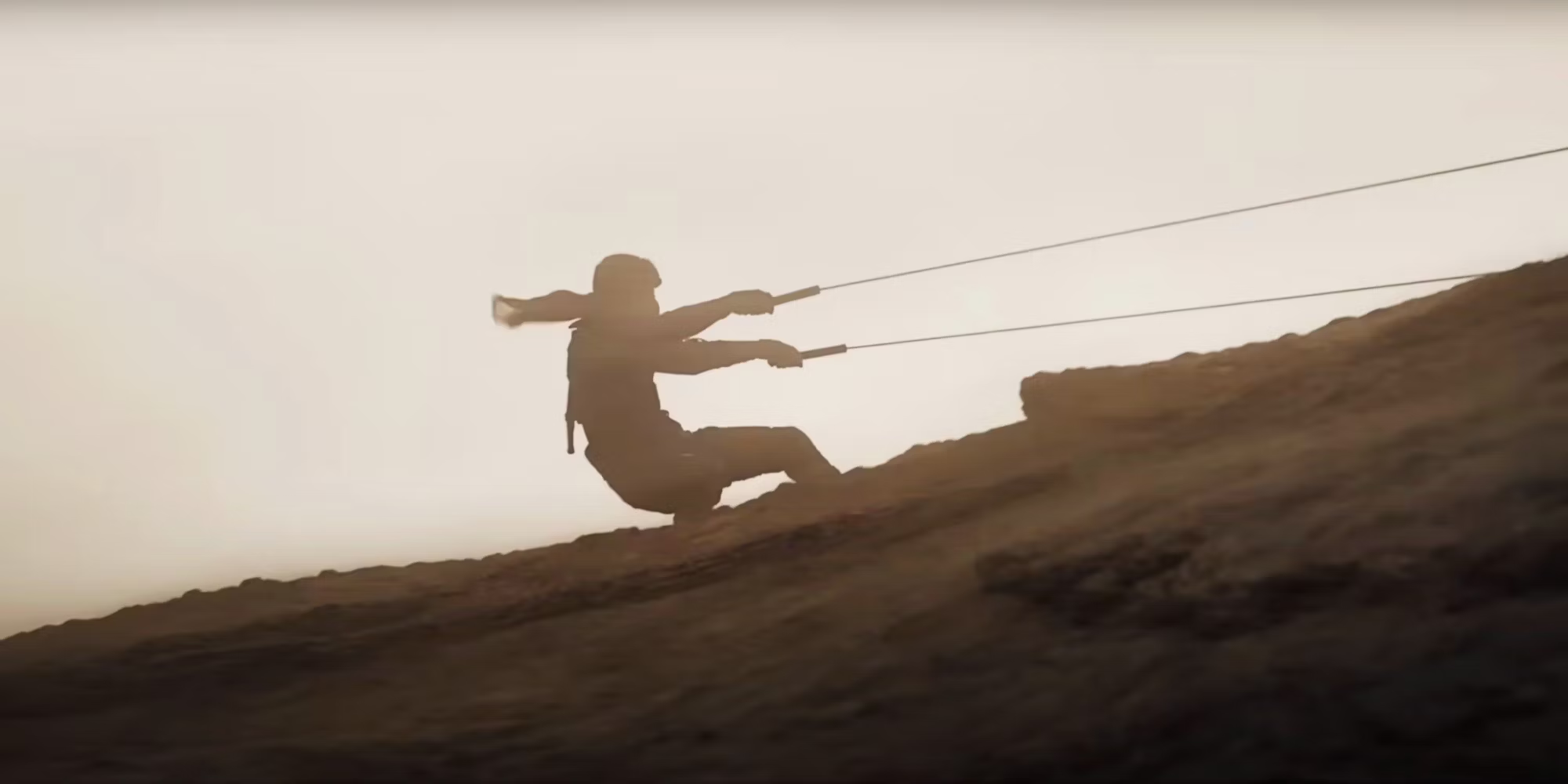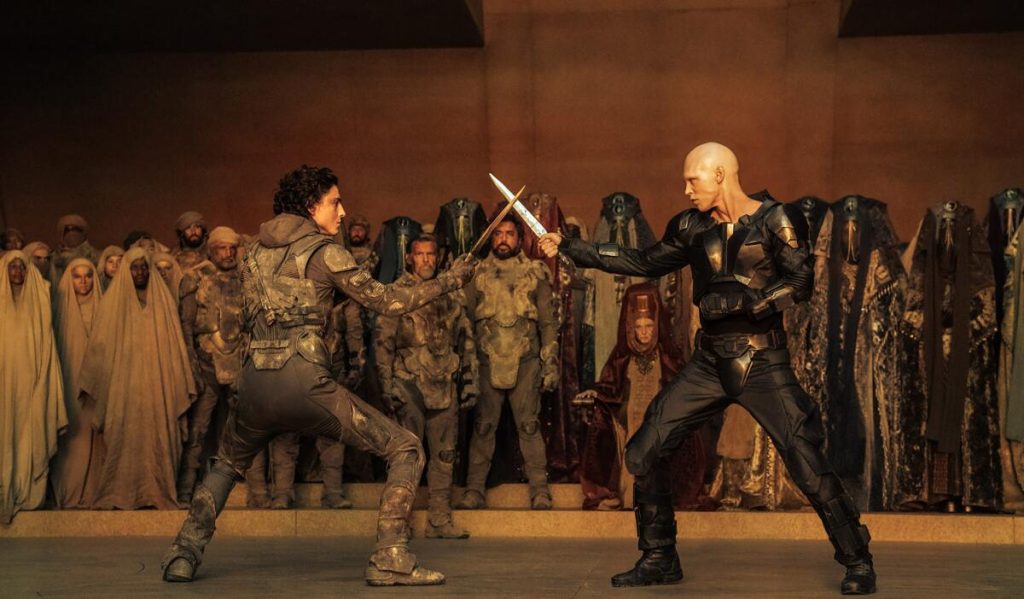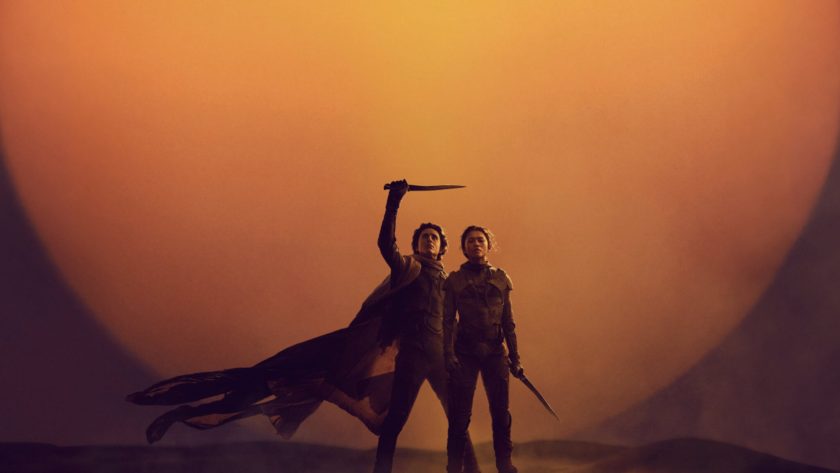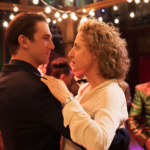Now the sand has settled on Denis Villeneuve’s second instalment in the hallucinatory sci-fi saga, Jamie Carlstrand writes about why he thinks the film joins the leagues of masterful epics throughout film history.
The term “epic” gets bandied about a lot nowadays, as it is increasingly used to laud oftentimes excessive and self-indulgent works. However, the word perfectly expresses Denis Villeneuve’s masterful Dune: Part Two. It is a film that is so massive it could only be encapsulated by the word epic, but also so expertly executed as to deserve another often overused word “masterpiece”. Villeneuve has constructed his sequel with such care that he manages to extract the most from every frame, and crafts a film which lingers but never languishes, and proves sprawling but never overwhelming. It is utterly, utterly, utterly brilliant.
The film directly follows on from the fall of House Atreides as Paul (Timothée Chalamet) and his mother Jessica (Rebecca Ferguson) are forced to live amongst Arrakis’ Freeman people. We follow them as Jessica, and an unwilling Paul, take advantage of ancient superstitions embedded by Jessica’s Bene Gesserit order to convince the Freeman that Paul is their messiah the Lisan-Al-Gaib. Intending that he will one day lead them against those who betrayed his family.
The original novel’s tale of distant imperial forces battling, and stoking religious fundamentalism, over a vital resource in a desert region was always a more incisive story than many realise. In this film version Villeneuve, along with co-writer Jon Spaiths, does a better job articulating and foregrounding such themes than even author Frank Herbert did himself.
This is best shown through Chani (Zendaya), who is updated from Paul’s suppliant lover in the book to a forthright thinker in her own right. It her who provides the film’s crucial critique of Paul and his mother’s proselytising. Villeneuve has accomplished wonders integrating such dense theological and political matter into a blockbuster film, allowing it to equally incite audiences’ intellectual and primordial thought.

Yet, it is the appeals to the primordial which produce Dune: Part Two’s most thrilling moments, through its barrage of sound, spectacle, and, of course, sand. Its bountiful set pieces are expansive and thrilling, but, most importantly, also methodically structured. The meticulous attention paid by director, along with cast and crew, is evident and it produces some of the most palpable cinema I’ve seen in years. This is witnessed nowhere better than when Paul first rides a sandworm amidst the whirlwind and cacophony of a collapsing sand dune. The sequence felt experiential to the extent I felt the urge to wipe the sand out my eyes. It just goes to show that for all the talk of immersive 3D, nothing can outshine a true IMAX extravaganza.
Dune only works though because its visual splendour is grounded in the committed performances of its stellar actors. The cast, starrier than an Arraken night sky, is too numerous to mention everyone. However, returning standouts remain Zendaya and Rebecca Ferguson. The latter continues her excellent work from the first film, even as her character becomes increasingly distant.
Newcomer Austin Butler, who regains my affection after an unfortunate stint of smouldering on Masters of the Air, offers a perfect depiction of the villainous Harkonnen Feyd-Rautha. He manages to be equal parts frightening and grotesque, while also alluring and charismatic. His introduction during a gladiatorial battle on the Harkonnen homeworld of Geidi Prime is breathtaking. Villeneuve saturates the scene in the monochromatic glow of a black-sun, and punctuates it with the almost indescribable sight of inkblot fireworks. This sequence, above all else, shows what an utterly visionary and audacious filmmaker he is.
I still have reservations about Chalamet, who at best is largely fine in the lead role. Yet, he still feels too sleight and foppish a performer to become the authoritative Lisan-Al-Gaib. His scenes commanding the Freeman in particular felt more like a yammering teenager than they did an imposing prophet.

My issues with Chalamet put aside, Dune: Part Two is one of the most remarkable films of recent years, perhaps since Dune: Part One. Villeneuve has taken an esoteric, hallucinatory, and at times frankly weird sci-fi novel and converted it to a big-screen blockbuster without sacrificing any of its essential parts. It is an absolute cinematic triumph and, without doubt, an epic masterpiece.




